Herbert Ingraham was born to Samuel Ingraham and Mary Etta Tatro (possibly De Etta) in Aurora, Illinois. He was the oldest of five, including Robert E. (3/4/1887), Zelista Marguerite (6/13/1888), Myrtle (8/11/1892), and Edward Roy (12/6/1895). Both Robert and Roy would become composers as well as Herbert, and Roy would work as an actor for many years. While Herbert's birth year is frequently shown as 1883, the 1900 census suggested that he was born in July of 1881. Comparing the records of his other siblings, including draft, marriage and other official listings, their birth years stay consistent. In addition, the census taken in April of 1910 shows his age as 28, which is also consistent with 1881 given his August birth date.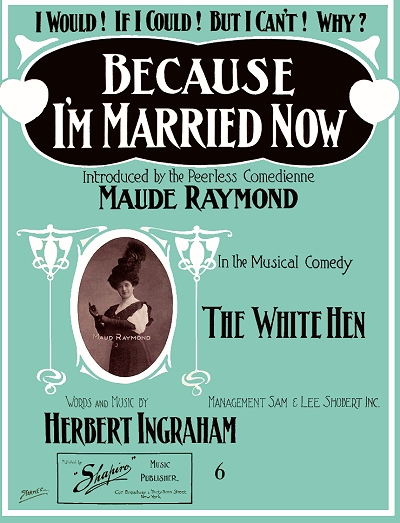 However, the marriage certificate for Samuel and Mary showed a date of September 13, 1881, strongly suggesting that Herbert was born in 1882, which confirms the date on his grave marker.
However, the marriage certificate for Samuel and Mary showed a date of September 13, 1881, strongly suggesting that Herbert was born in 1882, which confirms the date on his grave marker.
 However, the marriage certificate for Samuel and Mary showed a date of September 13, 1881, strongly suggesting that Herbert was born in 1882, which confirms the date on his grave marker.
However, the marriage certificate for Samuel and Mary showed a date of September 13, 1881, strongly suggesting that Herbert was born in 1882, which confirms the date on his grave marker. The family remained in Illinois until the early 1890s when they moved southwest to Indiana where Myrtle and Roy were born. Herbert was more or less a child prodigy, and he received musical training early in his life. While not much detail is available, he was listed in 1900 at age 18 as a professional musician in Hammond, Indiana. By 1902 he had moved to Chicago to pursue a career as a performer, and hopefully a composer. Ingraham formed and led an orchestra and a theatrical company in his early twenties, which appear on a few advertisements from 1904 to 1906. Nothing of his would be in print until 1905, but even at that his early songs showed a measure of polish in both music and lyrics, and an ability to lean in both comic and sentimental directions.
It took only one good song, Because I'm Married Now, to propel Herbert to fame. When publisher Maurice Shapiro heard a performance of the piece by New York singer Mabel Hite, he sought out the composer. Shapiro had struck out on his own after a brief business relationship with Jerome H. Remick and had been on the lookout for good talent. Finding that Ingraham lived in Chicago, Maurice ventured to the windy city, and within three hours of meeting the composer signed him as a staff composer. After a period of only limited success there was suddenly enough promise for a career that in early 1907 Herbert married his sweetheart Francis "Frankie" Sylvestra Campbell, then took off for New York City where would spend the rest of his abbreviated life. Shapiro Music Publisher at 39th and Broadway would become the home for most of Herbert's remaining pieces
As a career booster his first year in town, Ingraham had the song Mother's the Boss at Our House interpolated into the first edition of the Ziegfeld Follies, a launching pad for many composers. Because I'm Married Now found its way into the short-lived Knight for a Day. In 1908 Herbert would have his most popular ragtime work published, Poison Ivy. It was one of several rags he wrote, but one of the only ones to be printed separately.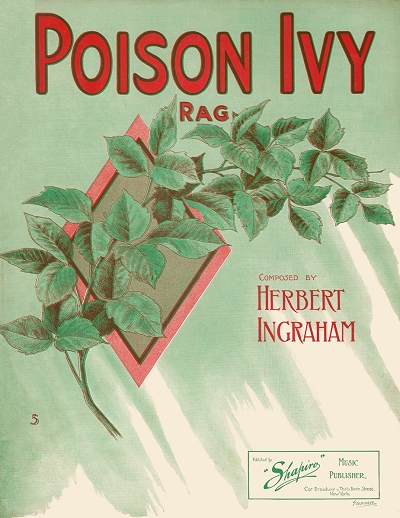 There were several more interesting pieces in 1908 that all fared well, and even without a big hit Ingraham was viewed as a great asset to Shapiro.
There were several more interesting pieces in 1908 that all fared well, and even without a big hit Ingraham was viewed as a great asset to Shapiro.
 There were several more interesting pieces in 1908 that all fared well, and even without a big hit Ingraham was viewed as a great asset to Shapiro.
There were several more interesting pieces in 1908 that all fared well, and even without a big hit Ingraham was viewed as a great asset to Shapiro.Unfortunately, late in 1907 he was diagnosed with the beginnings of tuberculosis, "the white plague," and soon took steps to deal with the then fatal disease. The news of his affliction finally broke in the trades as reported in The Music Trade Review of March 21, 1908:
Our readers who are familiar with the songs of Herbert Ingraham will be sorry to learn that this talented young writer was last week seized with a sudden attack of lung trouble which necessitated his immediate departure for the mountains. Maurice Shapiro, under whose wing Mr. Ingraham did his best work, spoke hopefully of the young composer's speedy return to health and his duties, when needless to say he will receive a cordial welcome. Mr. Ingraham for some time past has been a popular figure in song writers' Bohemia, and his many friends will no doubt take the suggestion to write him a few lines regarding the doings of his immediate set, which will no doubt be greatly appreciated by him during his temporary banishment.
In a follow-up on Ingraham's situation, The Music Trade Review of May 16, 1908 said that "The many friends of Herbert Ingraham, the well-known song writer, will be glad to hear that his improvement in health is so pronounced that he can now do his composing at the piano. He has rented a cottage at 32 Helen street, Saranac Lake, N. Y., where he will of course be glad to hear from his friends. His numerous songs published by Shapiro are doing remarkably well." In fact, he did have one notable piece by the end of the year. The November 21, 1908 Music Trade Review noted that "...'Roses Bring Dreams of You' is meeting with such unprecedented success. Mr. Ingraham arrived from Saranac Lake, where he has been living for some time on account of poor health. Not only did he look particularly well, but he brought with him two new songs, which he played over to our 'Man on the Street.' ... Mr. Ingraham returned to Saranac on Saturday last, where he will remain throughout the winter."
In 1909, a very busy year, many of his other rags, some likely composed as early as 1907, were released as Herbert Ingraham's Classic Rags in one of the first Shapiro single composer folios in print, making it also one of the first true ragtime folios ever as well. Also in 1909, another important work, Amo, was released as both an intermezzo and a song. The Ingrahams also released a daughter on July 8, 1909, who was not coincidentally named Herberta Amo. In another brush with the New York theater, the beginnings of a promising career there, he had five more songs interpolated into the play In Africa, including In the Little Town Across from Jersey City and In My Little Hottentot Hut for Two. All included lyrics by E. Ray Goetz. Unfortunately the production closed before it officially hit Broadway. As part of his comic sense he contributed two follow-up songs to a hit Jimmy Lucas and Harry Von Tilzer.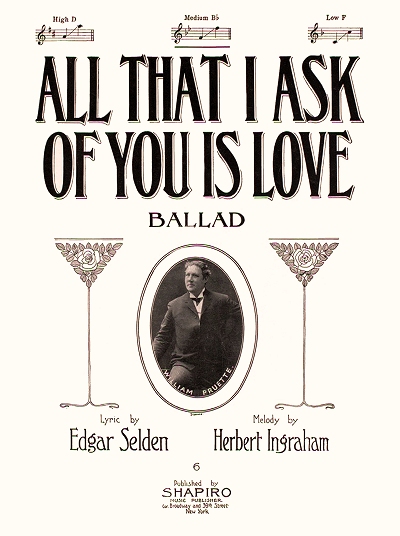 One was a direct answer to I Love, I Love, I Love My Wife, (But Oh You Kid!) titled (You Can Have Your "Oh You Kids," But) It's a Lovin' Wife for Mine. Another was the female take on the piece, I Love My Husband, But Oh, You Henry!.
One was a direct answer to I Love, I Love, I Love My Wife, (But Oh You Kid!) titled (You Can Have Your "Oh You Kids," But) It's a Lovin' Wife for Mine. Another was the female take on the piece, I Love My Husband, But Oh, You Henry!.
 One was a direct answer to I Love, I Love, I Love My Wife, (But Oh You Kid!) titled (You Can Have Your "Oh You Kids," But) It's a Lovin' Wife for Mine. Another was the female take on the piece, I Love My Husband, But Oh, You Henry!.
One was a direct answer to I Love, I Love, I Love My Wife, (But Oh You Kid!) titled (You Can Have Your "Oh You Kids," But) It's a Lovin' Wife for Mine. Another was the female take on the piece, I Love My Husband, But Oh, You Henry!.Things were going well in 1910 when Herbert's most poignant ballad, composed with frequent contributor Edgar Selden, found its way into the stores. Actually, the melding of lyrics and music for All That I Ask of You is Love, which was a nearly immediate hit, was a story of serendipity. The story was told in The Music Trade Review of September 3, 1910:
About six years ago the young composer fixed in mind a melody which had been slowly completing itself there. Storing it away in some musical recess, he awaited a lyrical translation for it. Forgetting it as far as his conscious mentality was concerned, he finally prepared to die. Three years ago he knew he was stricken with the white plague, but even then the gift of melody occasionally expressed itself. He journeyed to New York one day, a few weeks ago, leaving his bed to bear with him the written transcript of one such expression.
While consulting his publisher about this, he chanced to pick up a sheet of manuscript which Edgar Selden, the publisher's manager, had set aside for private perusal after the first flush of inspiration had passed. Not often, we should say, does this business man in the publisher's office set on paper the crystallized result of the workings of his hidden thoughts. Something of which we know not, however, and into which we have no wish to pry, had impelled the dramatic up through the prosaic in his mind, and then evolved the dramatic into the poetic. The part of him farthest removed from the office world had given birth to a cry for love, as we read between the lines.
The dying composer, Ingraham, seemed fascinated on the instant. Growing visibly excited as he read the manuscript, he finally exclaimed: "For six years I have had in my mind the melody for which these are the words!" Protests were unavailing, and when Ingraham played the melody the result was that the mutual expression of the sentiment and music, of either by the other, was so evident to the listeners that diffidence was forgotten and protests withdrawn. It is not a "high class" ballad, as it has been designated by the publisher. It is a simple song of the heart, voicing the one human longing that is as pure as it is everlasting. We may forget harmonic science for a moment and dream of the Greatest Thing in the World.
All That I Ask of You is Love has since been covered by many artists through the decades, even in the movies.
The Ingrahams were shown in the June 1910 census living in Manhattan in the Hotel Carlton, Herbert listed as a Music Composer. Curiously Amo was not there, but she may have been staying with a relative during the enumeration as Herbert was not at all well.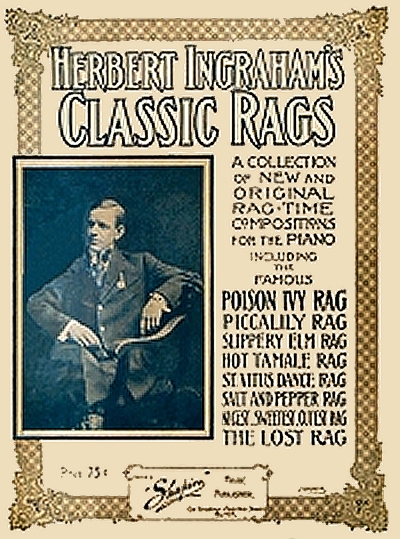 The July 23 Music Trade Review noted that:
The July 23 Music Trade Review noted that:
 The July 23 Music Trade Review noted that:
The July 23 Music Trade Review noted that:Maurice Shapiro, the music publisher, paid a hurried visit to Highland Mills, N.Y., the other day in response to a message that Herbert Ingraham, the composer, was dangerously ill. The message was to the effect that if he wanted to see Mr. Ingraham alive he must make all haste. As Mr. Ingraham is a close friend of the publisher's, as well as being the composer of some of Shapiro's most successful songs, the latter was naturally much perturbed during the trip, but he found the composer in no immediate danger. Mr. Ingraham is seriously ill, however, although his friends hope to see him again restored to health.
Despite great hopes and concerted efforts, the disease was far too advanced by that time. Herbert Ingraham passed on there in late August at age 28, depriving the music world of a composer and lyricist with great future promise. The Music Trade Review of September 3 laid out the sad news:
The world of popular music in general and music publishers in particular received with deep sadness last week the news that Herbert Ingraham, one of the youngest and most successful composers of the day in his sphere, had died at Saranac, N. Y. It was known some three years ago that he was afflicted with tuberculosis, and for the last two years he has been an invalid. Most of this summer he spent at Highland Mills, N. Y., as he had done in former years. On Sunday of last week he went to Saranac, hoping that the change would be beneficial. Instead, he lived only three days.
The funeral was held at Mr. Ingraham's old home in Whitney, Illinois. But the story does not end here.
The year after he died Selden and Shapiro published several of the songs he finished after Herbert's death, and teamed up with Melville J. Gideon for a follow up to their big hit titled I Give You All You Ask (Answer to All that I Ask). Maurice Shapiro also included many of his pieces in his famous series of Gem Dance Folios,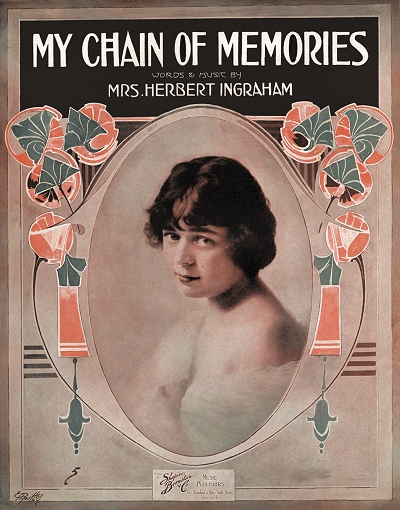 plus more runs of his most popular material, giving glowing descriptions of his late employee's work in advertisements. Then in 1913, Frankie, as Mrs. Herbert Ingraham, composed a beautiful tribute to Herbert. My Chain of Memories was "Dedicated to my beloved husband." The chorus lyrics are as follows:
plus more runs of his most popular material, giving glowing descriptions of his late employee's work in advertisements. Then in 1913, Frankie, as Mrs. Herbert Ingraham, composed a beautiful tribute to Herbert. My Chain of Memories was "Dedicated to my beloved husband." The chorus lyrics are as follows:
 plus more runs of his most popular material, giving glowing descriptions of his late employee's work in advertisements. Then in 1913, Frankie, as Mrs. Herbert Ingraham, composed a beautiful tribute to Herbert. My Chain of Memories was "Dedicated to my beloved husband." The chorus lyrics are as follows:
plus more runs of his most popular material, giving glowing descriptions of his late employee's work in advertisements. Then in 1913, Frankie, as Mrs. Herbert Ingraham, composed a beautiful tribute to Herbert. My Chain of Memories was "Dedicated to my beloved husband." The chorus lyrics are as follows:
My Chain of Memories of You, I'll Cherish Dear, my whole life thru;
A Rosary to me it seems, your face I'll always see in dreams.
My Love for You, 'twill always be, to last until eternity.
Each vow I hear, each promise dear, in my chain of memories.
A Rosary to me it seems, your face I'll always see in dreams.
My Love for You, 'twill always be, to last until eternity.
Each vow I hear, each promise dear, in my chain of memories.
In 1914, Herbert's younger brother Robert had his Mando Rag published by John Stark in St. Louis. Around 1916, the youngest brother Roy took up the family business and started in vaudeville, launching a long and successful career as a composer of popular songs and film music in his own right. In 1920, Frankie was living in Minneapolis with Amo (erroneously listed as Herbert A. by the enumerator), her widowed mother Lydia Campbell, and her widowed brother Eddie, who was shown to be a pianist and entertainer. She listed herself as a "writer of songs," but to date no other piece has surfaced with her name, unless she was using a pseudonym. At some point in the late 1920s, Amo H. Ingraham moved to Hollywood and got into motion pictures. For the 1930 enumeration she was living there with Frankie and Lydia, listing herself as an Actress in Motion Pictures. Frankie remained in Los Angeles for the next three years, passing on in October, 1933, of cancer at the age of 56, or, as reported by the state of California, 60. Her body was returned to Hammond, Indiana, and buried next to her beloved late husband Herbert. While in Hollywood in 1936, Amo took the time to renew many of her father's 1909 and 1910 copyrights in her name. She died in 1983 after a fairly steady career in show business. Roy died in 1988 after a similarly successful run.
Perhaps one of the most fitting tributes to his memory was that published by his peers in The Music Trade Review, September 3, 1910:
Noting an exception here and there, as just mentioned, we are sadly reminded that one such composer will write no more songs. The recent death of Herbert Ingraham is a loss to the world of popular music that will not soon have its compensation. Pure melody that stirs the heartstrings of the unthinking and also produces emotion in trained minds is rare indeed outside the limits of standard works which have unshakenly stood the test of time and constant repetition because of certain qualities of universal appeal. Ingraham had the gift of melody. Argument over what constitutes real music and carping over his possible lack of musicianly science are futile. The gift was there and was expressed in a few simple melodies of the kind that there is no resisting.
His last song, so called, was of this order, and by virtue of a happy chain of circumstances the melody is inseparable from the words, so that each seems one with the other, not to recur to mind as a thing apart. "All that I ask of you is love" haunts the mind—the human mind of infinite desire for the ideal, but of limited capacity when possessing it—even in the scant possibility of achieving it. The strain sounds the very keynote of longing. You find one expressing the other; the music seems the only possible vehicle for the thought. Strain, longing—melody, lyric. One and inseparable, the sentiment and its musical mate, thus wedded, were joined through no cool, calculating, business intent of composer and author, but through the inscrutable workings of the harmony of things for which the universe was meant, but which is too often jangled out of tune.
For all of us, Herbert lives on in his piano rags and touching ballads which are still performed over a century later.
The majority of this biography was assembled from public records and a number of newspaper and periodical reports on Herbert, primarily from 1908-1910, and later articles on his wife Frankie. A few extra details were provided by researcher John Waugh concerning parentage and birth information.

 Compositions
Compositions